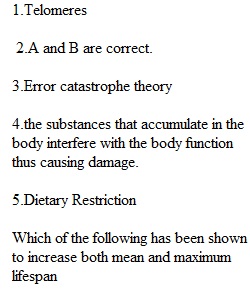


Q 1.The highly repeated ends of chromosomes that get shorter with each cell division are called: 2.Which of the following support the immune theory of aging? 3.Which theory of aging states that the age changes are not due to the genes themselves but rather to the damaged RNA and protein molecules? 4.The clinker theory of aging states that: 5.Which of the following has been shown to increase both mean and maximum lifespan
View Related Questions